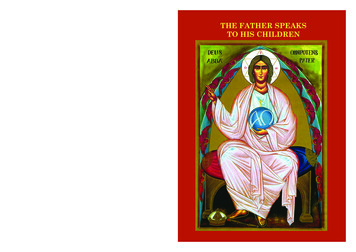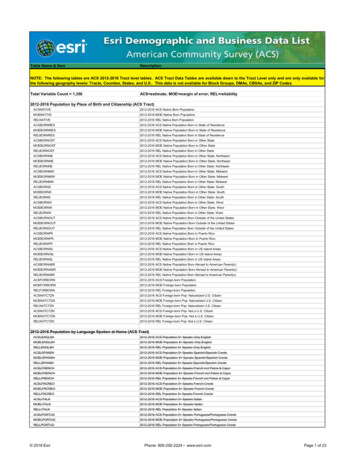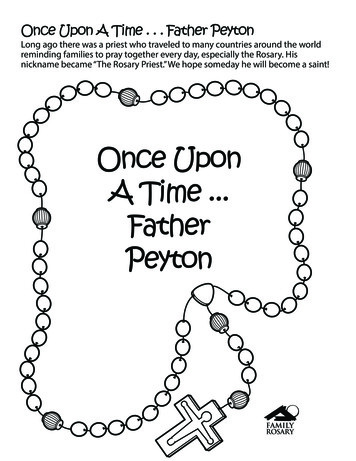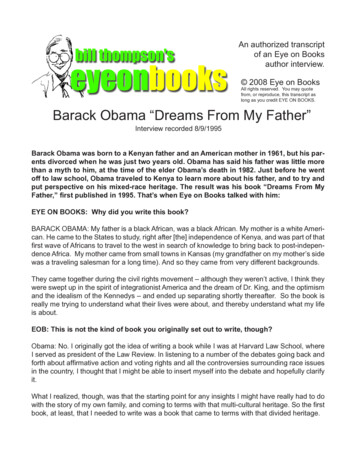
Transcription
THE FATHER SPEAKSTO HIS CHILDRENTHE FATHER SPEAKSTO HIS CHILDRENWe feel it our duty to publish a message,given to the world by God the Fatherthrough one of His creatures who loved Him so much,Sister Eugenia Elisabetta Ravasio,and recognised as valid by the Church.We are sure that this messagewill help people to understandthe deep tenderness the Father hasfor each of us, and we hope thatit will receive the widest possible circulation.
THE FATHER SPEAKSTO HIS CHILDREN Associazione“Dio è Padre - Casa Pater”c.p.135 L’Aquila 67100 ITALIAPro ManuscriptoNot for saleImprimatur: Petrus Canisius van Lierde, Vic. Generalise Vic. Civitatis Vaticanae, Roma die 13 Martii 1989.
CONTENTSPreface . 3Short biography of Mother Eugenia . 4Bishop Caillot’s Testimony . 7The Father’s Message - Part I . 16Message for the Pope . 35Message for the Pope . 38The Father’s Message - Part II . 42Prayer to God the Father . 63The First Icon of God the Father . 66
PREFACE“God is my Father!” This cry is being heard ever morefrequently in today’s world: people are coming to recognisethat God is indeed their Father.Consequently, we feel it our duty to publish a message,given to the world by God the Father through one of Hiscreatures who loved Him so Much, Sister Eugenia ElisabettaRavasio, and recognised as valid by the Church.We consider it appropriate to introduce this work byquoting the testimony of a former Bishop of Grenoble, theRight Reverend Alexandre Caillot. In 1935 he set up a boardof experts, drawn from various parts of France, to conduct adiocesan enquiry, which lasted ten years.Its members included the Bishop of Grenoble’s VicarGeneral, Mgr Guerry, theologian; the Jesuit brothers,Fathers Albert and Auguste Valencin-Amons, who rankedamong the foremost authorities in the field of philosophyand theology and were expert in evaluating such cases; andtwo doctors of medicine, one of whom was a psychiatrist.We are sure that this message will help people to understandthe deep tenderness the Father has for each one of us, andwe hope that it will receive the widest possible circulation.Father Andrea D’AscanioOFM Cap.3
MOTHER EUGENIEUGENIA ELISABETTA RAVASIOWho is Mother Eugenia, whom God the Father called “Mybeloved daughter”, “My little plant”?In our opinion, Mother Eugenia is one of the greatestlights of our times, the little prophet of a new Church, inwhich the Father is the centre and apex of all mankind, andin which unity is the highest ideal of spirituality. She is alight given by the Father to the world at this time of chaosand darkness, so that we may see the road that has to befollowed.She was born in San Gervasio d’Adda (now Capriato SanGervasio), a small town in the province of Bergamo, Italy,on 4 September 1907, in a family of peasant background.She received only an elementary education. After a fewyears working in a factory, she entered the Congregation ofOur Lady of the Apostles at the age of 20 years. It was herethat her great charismatic personality developed, leadingto her election as Mother General of the Congregation atthe age of only 25.Quite apart from her spiritual qualities, her work inthe social field alone would suffice to ensure her a place inhistory. In twelve years of missionary activity she openedover 70 centres - each with infirmary, school and church inthe remotest spots of Africa, Asia and Europe.It was she who discovered the first medicine for the cureof leprosy, extracting it from the seed of a tropical plant.This medicine was later studied and developed further atthe Pasteur Institute in Paris.4
She encouraged the apostolate of Raoul Follereau, who,following in her footsteps and building on the foundationslaid by her, is regarded as the apostle of the lepers.During the period 1939-41 she conceived, planned andbrought to fruition the project for a “Lepers’ City” at Azopte(Ivory Coast). This was a vast centre, covering an area of 200,000sq.m., for the care of leprosy sufferers. It remains even todayone of Africa’s and the world’s leading centres of its kind.In recognition of this achievement, France conferred thehighest national honour for social work on the Congregationof Missionary Sisters of Our Lady of the Apostles, of whichMother Eugenia was Superior General from 1935 to 1947.Mother Eugenia returned to the Father on 10 August 1990.Her most important legacy to us is the Message of theFather (“The Father speaks to His children”), the onlyprivate revelation made personally by God the Father andrecognised as authentic by the Church after ten years of themost rigorous examination. We reproduce at the beginningof the text the statement issued by Mgr Alexandre Caillot,Bishop of Grenoble, following the investigation.It is noteworthy that the Father (in 1932) dictated the Messageto Mother Eugenia in Latin, a language totally unknown to her.In 1981 this Message came to our notice, and in 1982, itsfiftieth anniversary, we published it in Italian.The many miracles of grace worked by the Messagehave led us to disseminate it gratis, especially in prisons,barracks and hospitals. In addition to English, it is availablein French, Italian, Spanish, German and other languages.5
TESTIMONY OF THE RIGHT REVEREND A. CAILLOT,BISHOP OF GRENOBLE, FOLLOWING THE REPORTPREPARED DURING THE CANONICAL ENQUIRYINTO THE CASE OF MOTHER EUGENIATen years have passed since, as Bishop of Grenoble, Idecided to open an enquiry into Mother Eugenia’s case.I now have enough information to bring my testimony asBishop before the Church.1) The first thing to emerge with certainty from theenquiry is that Mother Eugenia’s considerable virtues arewell established.From the beginning of her religious life, the sister hadattracted her superiors’ attention because of her piety, herobedience and her humility.Her superiors, perplexed by the extraordinary natureof the events which occurred during her novitiate, hadnot wanted to let her stay on in the convent. After somehesitation, they had to abandon their plan when faced withthe nun’s exemplary conduct.During the enquiry, Sister Eugenia showed great patienceand the utmost docility in submitting without complaint toall the medical tests, answering the theological and medicalcommissions’ often long and distressing questioning, andaccepting contradictions and trials. Her simplicity, inparticular, was praised by all the investigators.6
A number of circumstances also showed the nun to becapable of practising virtue to a heroic degree. Accordingto the theologians, an especially striking feature washer obedience during Father Auguste Valencin’s enquiryin June 1934, and her humility on the sad day of 20December 1934.I can attest that, while she was Superior General, Ifound her very devoted to her duty, dedicating herself toher task which must have seemed all the more difficultto her as she was not prepared for it - with great love forsouls, her Congregation and the Church. Those close toher are struck, as I myself am, by her strength of spirit infacing difficulties.I am impressed not only by her virtues but also by thequalities she displays in exercising her authority. Alsostriking is the fact that a relatively uneducated nun shouldcome to fill her Congregation’s highest office. In this there isalready something extraordinary and, from this point of view,the enquiry conducted by my Vicar General, Mgr Guerry, onthe day of her election, is very significant. The answers givenby the Chapter members and by the superiors and delegatesof the various missions showed that they were choosingMother Eugenia as their Superior General - in spite of heryouth and the canonical obstacles which would normally havecaused the idea of her nomination to be rejected - because ofher qualities of judgement, balanced temperament, energyand firmness. Reality would seem to have far surpassed thehopes that her electors placed in her.What I especially noticed in her was her lucid, livelyand penetrating intelligence. I said that her educationhad been inadequate, but this was for external reasons7
over which she had no control: her mother’s long illnesshad compelled her, at a very early age, to look after thehouse and be absent from school very often. Then, beforeshe entered the convent, there were the hard years sheworked in industry as a weaver. Notwithstanding thesebasic gaps, the consequences of which are evidenced in herstyle and spelling, Mother Eugenia gives many lectures inher community. It is worth noting that she herself compilesher Congregation’s circulars and the contracts withmunicipal authorities or administrative councils regardingthe hospital institutes of Our Lady of the Apostles. She hasalso compiled a long directory.She sees every situation clearly and correctly, as ifit were a matter of conscience. Her instructions arestraightforward, precise and very practical. She knows eachof her 1400 daughters personally, and also their attitudesand their virtues; hence she is able to select those who aremost qualified to perform various tasks. She also has anaccurate personal knowledge of her Congregation’s needsand resources. She knows the situation in every house andhas visited all her missions.We wish to emphasise also her spirit of far-sightedness.She has taken all the necessary measures for every hospitalor school to have qualified nuns and whatever they need tolive and develop. I find it particularly interesting to note thatMother Eugenia seems to possess a spirit of decisiveness,a sense of reality and a creative will. In six years she hasfounded 67 institutes and has been able to introduce veryuseful improvements in her Congregation.If I single out her qualities of intelligence, judgement andwill, and her powers of administration, it is because they8
seem to me to rule out definitively all the hypotheses abouthallucinations, illusions, spiritism, hysteria or delirium.These were examined during the enquiry but provedincapable of giving a satisfactory explanation of the facts.Mother Eugenia’s life is a constant demonstration of hermental and general equilibrium, which, to the observer,seems to be the dominant feature of her personality. Otherhypotheses, about suggestibility and manageability, ledthe investigators to wonder whether they might be dealingwith a very impressionable temperament, like a multifaceted mirror which reflects all influences and suggestions.These hypotheses were also rejected for reasons of everydayreality. Although Mother Eugenia is gifted with a sensitivenature and an emotional disposition, she has shown thatshe has never favoured anyone and, far from letting herselfbe influenced by human considerations, she has always beenable to determine her own projects and activities and to gainthe acceptance of others through her personal insight.2) The object of the mission which would appear to havebeen entrusted to Mother Eugenia is precise and, from thedoctrinal point of view, I see it as legitimate and timely.Its precise object is to make God the Father known andhonoured, mainly by the institution of a special feast whichhas been requested of the Church. The enquiry establishedthat a liturgical feast in honour of the Father would bequite in keeping with Catholic practice as a whole. It wouldaccord with the traditional thrust of Catholic prayer, whichascends to the Father, through the Son, in the Spirit,as shown by the prayers of the Mass and the liturgical9
oblation to the Father during the Holy Sacrifice. However,it is strange that there is no special feast in honour of theFather. The Trinity is honoured as such, the Word and theHoly Spirit are honoured by their mission and externalmanifestations. Only the Father has no feast of His ownwhich would draw the attention of the Christian people toHis Person. This is the reason why a fairly extensive surveyof the faithful has shown that, in the various social classesand even among many priests and religious, “the Father isunknown, no one prays to Him, no one thinks of Him”. Thesurvey reveals, rather surprisingly, that a large number ofChristians remain distant from the Father because they seeHim as a terrifying judge. They prefer to turn to Christ’shumanity. And how many ask Jesus to protect them fromthe Father’s anger!A special feast would thus have the effect firstly of reestablishing order in the spirituality of many Christiansand, secondly, of leading them back to the Divine Saviour’sinstruction: “Everything you ask the Father in My name.”and again “You will pray like this: ‘Our Father. A liturgical feast dedicated to God the Father wouldalso have the effect of raising our eyes towards the OneWhom the apostle St. James called “the Father of light,from Whom every gift comes.” It would accustom souls toconsider God’s goodness and His fatherly providence. Theywould realise that this providence is truly that of God theHoly Trinity, and that it is because of His divine nature,common to all three Persons, that God spreads through theworld the ineffable treasures of His infinite mercy.It would seem, at first sight, as if there were no specialreason to honour the Father in particular. But was it not the10
Father Who sent His Son into the world? If it is supremelyright to show devotion to the Son and the Holy Spirit becauseof their external manifestations, would it not be right andproper to give thanks to God the Father, as the Prefaces ofthe Mass require, for the gift He sent us, His Son?The real object of this special feast thus becomes plain: tohonour the Father, to thank Him, to praise Him for havinggiven us His Son; in a word, as the message states, as theAuthor of our Redemption; to thank Him Who loved theworld so much that He gave His only-begotten Son, so thatall men might be brought together in the Mystical Body ofChrist and, together with this Son, become His children.At a time when the world is troubled by secular doctrines,atheism and modern philosophies and no longer recognisesGod, the true God, would not this feast make known tomany the living Father, the Father of mercy and goodness,Whom Jesus has revealed to us? Would it not contributeto an increase in the number of those who worship theFather “in spirit and in truth”, to whom Jesus referred?Now, when the world is being torn apart by deadly wars,when it feels the need to seek a solid principle of union tobring the peoples closer together, this feast would bring agreat light. It would teach men that they all have the sameFather in heaven: the One Who gave them Jesus, towardsWhom He draws them as members of His Mystical Body inthe unity of the same Spirit of Love! When so many soulsare weary and tired of the tribulations of war, they maywell be hungering for a deep spiritual life. Might not such afeast call them, then, “from within”, to worship the FatherWho hides Himself, and to offer themselves in a filial andgenerous oblation to the Father, the only source of the lifeof the Holy Trinity in them? Would it not preserve that11
fine movement of supernatural life which naturally drawssouls towards spiritual childhood and - through confidence- towards filial life with the Father, towards abandonmentto the divine will, towards the spirit of faith?On the other hand, a problem of doctrine arises, quiteapart from the question of a special feast and regardless ofwhat the Church may decide on this matter. Some eminenttheologians believe that the doctrine of the soul’s relationshipwith the Trinity needs to be examined more deeply, andthat it could be for souls a source of enlightenment on thelife of union with the Father and the Son, about which St.John speaks, and on the sharing in the life of Jesus, Son ofthe Father, especially in His filial love for the Father.But, apart from these theological reasons, what I wishto underline here is this: a poor young woman, unversed intheology, declares that she is receiving messages from God,and these may be very rich in doctrine.The works of an imaginary visionary are poor, barrenand inconsistent. However, the message that MotherEugenia says the Father entrusted to her is fertile. There isa harmonious interaction of two different characters whichtends to confirm its authenticity. On the one hand, it ispresented as something traditionally held by the Church,without any suspicious innovations, for it incessantlyrepeats that everything has already been said in Christ’srevelation about His Father, and that everything is in theGospel. But on the other hand, it declares that this greattruth, concerning knowledge of the Father, needs to bereconsidered, studied deeply and experienced.Does not the disproportion between the weakness ofthe instrument, incapable of discovering a doctrine of12
this nature by itself, and the depth of the message beingconveyed, reveal that a superior, supernatural, divine causehas intervened to entrust the sister with this message?I cannot see how, humanly speaking, one could explainthe nun’s discovery of an idea, the originality and fecundityof which the theologians conducting the enquiry were ableto perceive only gradually.Another fact seems to me equally significant: whenSister Eugenia made it known that she had been receivingapparitions of the Father, the investigating theologiansreplied that apparitions of the Father were in themselvesimpossible and that they had never occurred before inhistory. The sister held out against these objections,declaring simply: “The Father told me to describe what Isaw. He asks His sons, the theologians, to search.” The nunnever changed her testimony in any way. She maintainedher statements over many months. It was not until January1934 that the theologians discovered in St. Thomas Aquinashimself the answer to their objection.The answer given by the great doctor of the Churchabout the distinction between apparition and mission wasenlightening. It removed the obstacle which was paralysingthe whole enquiry. Challenged by wise theologians, theuneducated little nun proved to be right. How, humanlyspeaking, could we explain, in this case too, the nun’sinsight, wisdom and perseverance? A false visionarywould have tried to adapt herself to the theologians’explanations. The nun, however, held her ground. Theseare the additional reasons why her testimony seemstrustworthy to us.13
In any case, what I find worthy of note is her reservedattitude towards the miraculous aspects of the case.While false visionaries give pride of place to extraordinaryphenomena and even see nothing but these, MotherEugenia, on the contrary, puts them second, as proofs, asmeans. There is no state of exaltation, but there is a balanceof values which makes a favourable impression.I will refer only briefly to the theologians’ enquiry.The Reverend Fathers Albert and Auguste Valencin arehighly esteemed for their philosophical and theologicalauthority, and for their deep knowledge of the spiritual life.Their intervention was required in other, similar enquiries.We know that they acted with great circumspection, andthat is why we selected them for this work.We are grateful for their devoted and conscientiouscollaboration. Their testimony in favour of the sister and ofa supernatural explanation of the facts as a whole is all themore remarkable as they delayed their judgement for a longtime, being at first hostile and sceptical, and then hesitant.Little by little, they became convinced, after raising allkinds of objections and imposing hard tests on the nun.14
CONCLUSIONSFollowing the dictates of my soul and my conscience, andwith the keenest sense of my responsibility to the Church, Ideclare that supernatural and divine intervention seems tome the only logical and satisfactory explanation of the facts.Isolated from all the surrounding features of the case,this essential fact seems to me to be noble, lofty andsupernaturally rich: that a humble nun has called soulsto true devotion to the Father, such as Jesus taught andthe Church has enshrined in its liturgy. There is nothingalarming in this, only something that is very simple and inaccordance with solid doctrine.The miraculous facts which accompany this message couldbe separated from the main event and its value would still bepreserved in its entirety. For doctrinal reasons, the Church willdeclare whether the idea of a special feast can be consideredseparately from this particular case involving the sister.I believe that the fundamental proof of the authenticityof the nun’s mission is shown by the way in which she putsinto practice in her life the beautiful doctrine which shewas apparently destined to remind us of.I deem it proper to let her continue her work. I believethat the hand of God is in all this. After ten years ofresearch, reflection and prayer, I bless the Father for havingdeigned to choose my diocese as the place for such touchingmanifestations of His love. Alexandre CaillotBishop of Grenoble15
THE FATHER’S MESSAGEPart IJuly 1, 1932Feast of the Precious Blood of Our Lord Jesus ChristHere, finally, is the day, blessed for ever, the day thecelestial Father promised!Today the long days of preparation are over, and I feelclose, so close, to the coming of my Father and the Fatherof all men.A few minutes of prayer, and then what spiritual joys! Iwas overwhelmed by the desire to see Him and hear Him!My heart, burning with love, opened up with such greatconfidence that I realised that, until then, I had never beenso trusting with anyone.The thought of my Father made me, as it were, madlyhappy.Finally I began to hear singing. Angels came to announcethis glad arrival! Their songs were so beautiful that Idecided to note them down as soon as possible.16
This harmony ceased and then came a procession of theelect, the cherubim and seraphim, with God, our Creatorand our Father.Prostrate, with my face to the ground, sunk in my ownnothingness, I said the Magnificat. Immediately afterwards,the Father told me to sit close to Him and write what Hehad decided to say to men.The entire heavenly court who had accompanied Himvanished. Only the Father remained with me and, beforesitting, He said:“I have already told you and now I say it again: I cannotgive My beloved Son another time to prove My love for men!I am now coming among them in order to love them andto make them know this love, assuming their image, theirpoverty. Look, now I am putting aside My crown and all Myglory to take on the appearance of an ordinary man!”Having assumed the appearance of an ordinary man byplacing His crown and His glory at His Feet, He took theglobe of the world and held it to His Heart, supporting itwith His left Hand. He then sat next to me.I can say but a few words about His arrival and aboutthe appearance He deigned to assume, and about His love!In my ignorance I do not have words to express what Herevealed to me.“Peace and salvation,” He said, “to this house and to thewhole world! May My power, My love and My Holy Spirittouch men’s hearts, so that all mankind may turn to salvationand come to its Father, Who seeks it, to love and to save it!17
Let My Vicar Pius XI understand that these are daysof salvation and blessing. Let him not fail to take thisopportunity to call the attention of the children to theirFather, Who is coming to help them in this life and toprepare their everlasting happiness.I have chosen this day to begin My work among menbecause today is the feast of the Precious Blood of My SonJesus. I intend to bathe in this Blood the work I am beginning,so that it may bear great fruit among all mankind.This is the real purpose of My coming:1. I am coming to banish the excessive fear that Mycreatures have of Me, and to show them that My joy liesin being known and loved by My children, that is, by allmankind, present and future.2. I am coming to bring hope to men and nations. Howmany have long since lost it! This hope will make them livein peace and security, working for their salvation.3. I am coming to make Myself known just as I am, sothat men’s trust may increase together with their love forMe, their Father. I have but one concern: to watch over allmen and love them as My children.The painter delights in contemplating the picture he haspainted. In the same way, it is My pleasure and delight tocome among men, the masterpiece of My creation!Time presses. I wish men to know as soon as possiblethat I love them and that I feel the greatest happiness inbeing with them and talking with them, like a father withhis children.18
I am the Eternal One, and when I was alone, I had alreadythought of using all My power to create beings in My image.But material creation had to come first, so that these beingscould find their means of sustenance; it was then thatI created the world. I filled it with all the things I knewwould be necessary to men: air, sun and rain, and manyother things that I knew to be necessary for their life.In the end, man was created! I was pleased with Myhandiwork. Man sins, but it is precisely then that Myinfinite generosity shows itself.In the Old Testament, I created and chose prophets to liveamong men. To them I told My desires, My sorrows and Myjoys, so that they could communicate them to everyone.The more evil grew, the more My goodness urged Me tocommunicate with just souls so that they could transmitMy commands to those who were creating disorder. Thus, Iwas sometimes obliged to be strict in order to reprove them;not to punish them - that would only have done harm - butto take them away from vice and lead them to their Fatherand their Creator, Whom they had forgotten and ignored intheir ingratitude. Later, evil overwhelmed men’s hearts tosuch an extent that I was compelled to send calamities uponthe world to purify men through suffering, the destructionof their possessions, or even their death. These were theFlood, the destruction of Sodom and Gomorrah, man’s warsagainst man, etc.I have always wished to remain in this world among men.So, during the Flood, I was close to Noah, the only justman then. In the other calamities, also, I always found ajust man with whom I could stay and, through him, I livedamong the men of that time, and it has always been thus.19
The world has often been purified of its corruption becauseof My infinite goodness towards humanity. I continued tochoose certain souls in whom I was pleased, because throughthem I could be happy with My creatures, men.I promised the world a Messiah. I did all I could to prepareHis coming, showing Myself in the figures that representedHim, even thousands of years before His coming!For who is this Messiah? Whence does He come? Whatwill He do on earth? Whom does He represent?The Messiah is God.Who is God? God is the Father, the Son and the HolySpirit.Whence does He come? Or rather, who ordered Him tocome among men? It was I, His Father, God.Whom is He to represent on earth? His Father, God.What is He to do on earth? He will make the Father, God,known and loved.Did He not say:“Do you not know that I must be about My Father’sbusiness?”(“Nesciebatis quia in his quae Patris mei sunt oportet meesse?” St. Luke, ch. 2, v. 49).20
“I have come only to do the will of My Father.”“Whatever you ask the Father in My name, He will giveyou.”“You will pray to Him like this: ‘Our Father, Who artin heaven.’, and elsewhere, since He came to glorify theFather and to make Him known to men, He says:“Whoever sees Me, sees the Father.”“I am in the Father and the Father is in Me.”“No one comes to the Father except through Me” (‘’Nemovenit ad Patrem nisi per me” St. John, ch. 14, v. 6)“Whoever is with Me is also with My Father”, etc.?Realise then, O men, that for all eternity I have had butone desire, to make Myself known to men and be loved bythem. I wish to stay for ever with them.Do you want an authentic proof of this desire that I havejust expressed?Why did I command Moses to build a tabernacle and theark of the covenant, if not to come and dwell, as a Father,a brother, a close friend, with My creatures, men? Thiswas My ardent desire. In spite of this, they have forgottenMe and offended Me with countless sins. I gave Moses Mycommandments to remind them, in spite of everything, ofGod, their Father, and of His sole wish, to save them. Theywere supposed to observe the commandments and thereby21
remember their infinitely good Father, always intent upontheir present and eternal salvation.All this was forgotten and men sank into error and fear,considering that the observance of the commandments as Ihad transmitted them to Moses was too taxing. They madeup other laws in accordance with their whims, in order toobserve them more easily. Little by little, in the exaggeratedfear they had of Me, they forgot Me more and more andheaped outrages upon Me.Yet My love for these men, My children, never quiteceased. When I realised that neither the patriarchs nor theprophets had been able to make Me known and loved bymen, I decided to come Myself.But how could I come among them? There was no otherway than to come Myself, in the second Person of Mydivinity.Would men know Me? Would they listen to Me?Nothing in the future was hidden from Me; I Myselfanswered these two questions:“They will ignore My presence, even though theywill be near Me. In My Son they will treat Me cruelly,notwithstanding all the good He will do for them. In MySon they will speak ill of Me, they will crucify Me to bringabout My death.”Shall I stop because of this? No, My love for My children,men, is too great.22
I did not stop there. Understand well that I loved you, asit were, more than My beloved Son, or rather, more thanMyself.What I am telling you is so true that, if one of My creatureshad been enough to atone for the sins of other men througha life and death similar to those of My Son, I would havehesitated. Why
TO HIS CHILDREN THE FATHER SPEAKS TO HIS CHILDREN We feel it our duty to publish a message, given to the world by God the Father through one of His creatures who loved Him so much, Sister Eugenia Elisabetta Ravasio, and recognised as valid by the Church. We are sure that this message will help people to understand the deep tenderness the Father has










